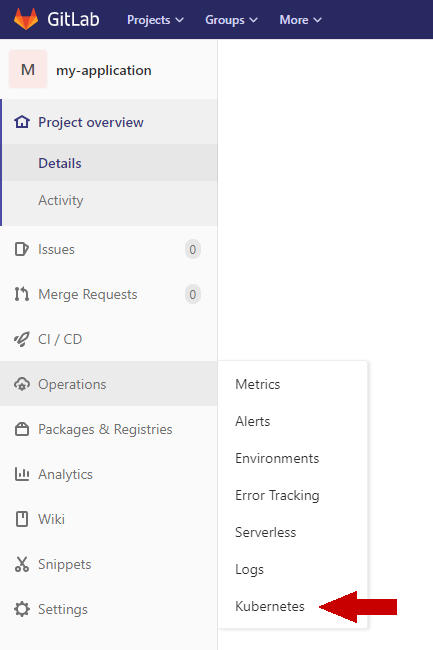GitLab CI Microk8s integration
Note: This guide applies for Kubernetes versions prior to 1.24. Moreover, Kubernetes integration in GitLab is now achieved via the GitLab agent for Kubernetes. This guide is meant for legacy support.
GitLab provides Kubernetes integration out of the box, which means that GitLab CI/CD Pipelines can be used to deploy applications in Kubernetes easily. This guide presents how to integrate a Kubernetes cluster in a GitLab Project and follows Gitlab documentation. For this particular case, the cluster will be that of a Microk8s Kubernetes distribution.
Once a project has been created ion GitLab, go to the Operations menu of the project in GitLab and click Kubernetes.
Once in the Kubernetes section of the project, click “Add Kubernetes cluster” And then click the “Add Existing Cluster” tab.
Apart from giving a name of your choice to the cluster, three pieces of information are required to register a kubernetes cluster in GitLab:
- The API URL of the cluster
- The CA certificate of the cluster
- The service token of the GitLab service account in the cluster
API URL
The API port of a Microk8s cluster is 16443. Thus, the API URL should be in the form https://<Server IP>:16443, where <Server IP> is to be replaced with the IP of the server where the Microk8s cluster is running.
CA certificate
The CA certificate of the cluster can be retrieved using the following command:
microk8s.kubectl get secret $(microk8s.kubectl get secrets | grep default-token | awk '{print $1}') -o jsonpath="{['data']['ca\.crt']}" | base64 --decode
The command should output the certificate of the cluster in the following form:
-----BEGIN CERTIFICATE-----
MIICwTCCAamgAwIBAgIEMv8+mzANBgkqhkiG9w0BAQsFADAVMRMwEQYDVQQDDApJ
bnRlcm1lZENBMB4XDTIwMDYwMjAzNDkzMVoXDTI1MTIzMTAwMDAwMFowETEPMA0G
A1UEAwwGYXNkYXNkMIIBIjANBgkqhkiG9w0BAQEFAAOCAQ8AMIIBCgKCAQEA1Mwr
RKEaDgevx5xFdhNTdmHvC0Q3G2eUr0LECd/WVV7LzIZ0iZIqqMHY/c++IG6IaKRY
nD3zwsQS1xfw1OiqgWxBHhmEksRHVIm5OG60kmuNVyXbw3TyKOxBplC1UaYdKc9f
U7ywp9KY70lxL7jzEEbEEkVhq/EDDUnFII2nhSBYifpcdmoi24NtrwTTjBiO7rg5
GOrifksQykCnZoMzBBedbq4rzB2/vSTWeAeMRE5X0vfArQzvHS6kSWwAPD9tH+1W
8t4vkUI1HQrjPU+Al5oYNaB73oOeG9APZa7TelvwO+h8Lo7rZ+b2TIC9Q4ghiq2D
yEz5Sew0Db5LfaLhSQIDAQABox0wGzAOBgNVHQ8BAf8EBAMCB4AwCQYDVR0TBAIw
ADANBgkqhkiG9w0BAQsFAAOCAQEAAKTJtXgadrDcumDTnemDEAvRmKBHA6+pjadO
PUKYx426qh37Dzf0YQSYIMPZ0DTojs3kahU7QpGziJjGlXRwJsK2HBmFpqTPBxvf
6qfYvzkcicaDUNEcw4xubFLeo6T0r0L9hzsWJ7H9dIP6hYxQ1SnLVJtk/yP1WzyS
kVlnylXsf0mimfkQNfN1I2RJfPjpX6aAq4XereUFbNFXWA7Nl/36YNMSQWoGPps7
Rz7uXOy3p2VS+FsHUmBGDjX5x7koAJbE3+h9xn+bqwkHy3roxHOgI2fxjvARHgsg
58SIFfm6D+9Pisp2ej/gd7uX/k95FzVgnaVDQMoCyC0tPcbcUw==
-----END CERTIFICATE-----
Service token
Finally, the service token can be obtained by creating a service account for GitLab in the Kubernetes cluster. This requires RBAC to be enabled in the Kubernetes cluster. For Microk8s, RBAC can be enabled easily using
microk8s enable rbac
The GitLab service account can be created just like any other Kubernetes resource using a manifest file. Thus, create a file named gitlabserviceaccount.yml with the following content
apiVersion: v1
kind: ServiceAccount
metadata:
name: gitlab-admin
namespace: kube-system
---
apiVersion: rbac.authorization.k8s.io/v1beta1
kind: ClusterRoleBinding
metadata:
name: gitlab-admin
roleRef:
apiGroup: rbac.authorization.k8s.io
kind: ClusterRole
name: cluster-admin
subjects:
- kind: ServiceAccount
name: gitlab-admin
namespace: kube-system
The resources can be created by running
microk8s.kubectl apply -f gitlab_service_account.yml
With the newly created service account, the token can be retrieved using this command:
microk8s.kubectl -n kube-system describe secret $(microk8s.kubectl -n kube-system get secret | grep gitlab-admin | awk '{print $1}')
Which should output the following
Name: gitlab-admin-token-xwb79
Namespace: kube-system
Labels: <none>
Annotations: kubernetes.io/service-account.name: gitlab-admin
kubernetes.io/service-account.uid: 6b9a089a-0b55-4546-947c-8954507a754d
Type: kubernetes.io/service-account-token
Data
====
token: eyJhbGciO893mlaKlas73ASm3...30cvPbicVMm98asdSDD9uFas29OASJeUBQ
ca.crt: 1103 bytes
namespace: 11 bytes
Here, simply copy and paste the long string after token into the GitLab configuration page.
With those steps completed, the only thing left to do is to click save and the cluster should be integrated in GitLab.

